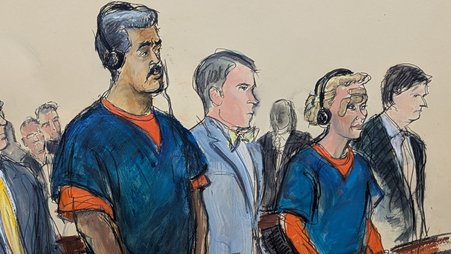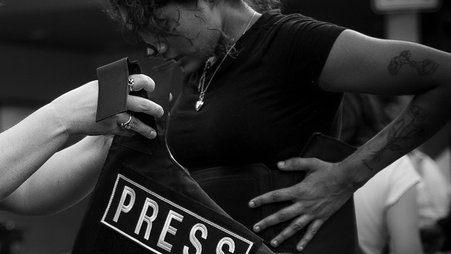
A protest after journalist Jamal Khashoggi was murdered by the government of Saudi Arabia
Saudi journalist and dissident Jamal Khashoggi openly criticized governments — including his own. He paid for his courage with his life.
One year ago, on October 2, 2018, Khashoggi entered the Saudi Consulate in Istanbul to obtain documents related to his upcoming marriage. Instead, he was brutally murdered, and Saudi officials engaged in an extensive attempt to cover up their role in the assassination. The Washington Post reported last October that "The crown prince of Saudi Arabia ordered an operation to lure Washington Post columnist Jamal Khashoggi back to Saudi Arabia from his home in Virginia and then detain him, according to U.S. intelligence intercepts of Saudi officials discussing the plan." The CIA reached the same conclusion that it was Crown Prince Mohammed bin Salman that personally orchestrated the murder.
His killers have yet to face justice.
Salman, incredibly, denies that he had a hand in murdering Khashoggi, and maintains that he had no knowledge of any assassination plan. He says that then anyone found responsible for such consequences. But he has mercilessly cracked down on anyone who even lightly criticizes the Saudi state and royal family. He has ordered the arrest and detention of hundreds of people, many of them journalists, academics, and human rights activists. Saudi Arabia is quick to label dissidents terrorists, or threats to national security — a hallmark of authoritarian regimes.
Women’s rights activists who advocated for lifting of the state ban on women driving have been investigated and arrested, and some even tortured. And numerous journalists have been arrested as well, including 16 in 2018 alone. This April — months after the murder of Khashoggi and intense international outrage and scrutiny in response — Saudi authorities arrested at least 12 activists and writers, including four journalists.
"With the arrests of these four journalists, Crown Prince Mohammed bin Salman is showing the world that his attitude toward journalists has not changed as a result of the blowback following his government's killing of Jamal Khashoggi last year," Committee to Protect Journalists Middle East and North Africa Program Coordinator Sherif Mansour said.
The Saudi government may even target its critics with spyware. A Saudi dissident alleged in a lawsuit last year that Pegasus — a type of software made by NSO Group that compromises mobile devices — was used in an attempt to spy on journalist Jamal Khashoggi before he was murdered.
Khashoggi’s fiancee Hatice Cengiz has not stopped pushing for answers and accountability — not only for Khashoggi, but other political prisoners. On September 26 of this year, she told the Associated Press that she is dedicated to continuing to bring attention to Khashoggi’s death. “...Of course, nothing will bring Jamal back,” she said through a translator. “For this reason, my aim is to also give a voice to thousands of prisoners in Saudi Arabia.”
The people responsible for Khashoggi’s killing have not only evaded justice, but have continued to show a blatant disregard for human rights and freedom of the press. Any real accountability for the murder of Khashoggi must start with releasing the political prisoners and journalists who have been arrested for speaking out.
In the aftermath of Khashoggi’s murder, President Trump reiterated that the United States stands with Saudi Arabia.
“It could very well be that the Crown Prince had knowledge of this tragic event,” Trump said, though “maybe he did and maybe he didn’t!”
It may not be particularly surprising that Donald Trump — who has verbally attacked journalists incessantly throughout his presidency — would prioritize a relationship with an authoritarian nation over defending press freedom. Trump has expressed admiration for other world leaders who are cracking down on journalism and dissent, including Philippines President Rodrigo Duterte in the Philippines.
The consequences of powerful world leaders failing to defend civil liberties are serious. Trump’s disregard for press freedom in the United States, and his inaction on the international stage, effectively grants other governments a green light to do the same.
Journalists all over the world face immense risks doing their critical work — from surveillance and targeting with spyware to threats to their lives and families. Even journalists living in countries with relatively strong press freedom protections are often forced to act like spies in order to protect their sources and the integrity of their reporting. Although there may always be some element of risk in doing brave journalism, these threats should not be normalized as just “part of the job.”
One year since the tragic murder of Jamal Khashoggi, and press freedom remains under threat. It is critical that his killers face justice, and that everyone — from world leaders to civil libertarians — loudly condemn his murder and all threats to journalism.




